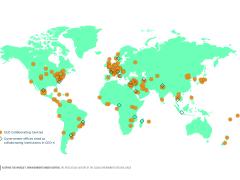Companies badly needed for biodiversity targets
Nature and biodiversity are being lost worldwide, and the capacity of ecosystems to provide services to people is deteriorating. Most of the targets for 2020 of the UN-Convention on Biological Diversity (CBD) will not be achieved and if the trends of the last decades persist, biodiversity will continue to decline. A new agreement to end biodiversity loss and promote nature restoration is presently being negotiated by the 195 countries that signed the convention. The necessary changes in our production and consumption practices require involvement of the whole of society, with a crucial role for the business community and the financial sector.
This policy brief describes what Dutch companies are doing and could be doing to contribute to reverse biodiversity loss and even restore nature, and identifies their strategies and motivations. This assessment enables governments to create an intervention logic to mobilise the business community to contribute to biodiversity targets. The policy brief summarises research by PBL, RSM (Rotterdam School of Management) and other partner institutes on nature-inclusive activities of Dutch businesses and financial institutions, and lessons learned for governments to engage and mobilise business.
In 2019, the Intergovernmental Science-Policy Platform on Biodiversity and Ecosystem services (IPBES) stated that biodiversity goals may only be achieved through transformative change in society and economy, demanding fundamental changes in production and consumption patterns. The recently published European biodiversity strategy also calls for such a transition. Currently, negotiations are ongoing between the 195 countries that signed the convention on targets for the 2030-2050 period, and on strengthening implementation mechanisms. Within the CBD, there is a need for more advanced insights into how to involve societal parties and especially the business and financial sectors in achieving the targets.
Businesses and financial institutions are actively involved, in various ways in integrating biodiversity into their business models. To bring about the necessary fundamental changes, targeted government policies are needed to mobilise more companies – including market leaders, followers and laggards. This requires various approaches and specific instruments that tie in with the different types of motives for sustainable and nature-inclusive entrepreneurship. An example of such an instrument is transparency on sustainability issues, and PBL has previously published a critical reflection on the use of this instrument. To convince financial institutes to take biodiversity better into account in their investment decisions, the consequences of biodiversity loss for them need to be clear. A first study on this subject was published in June in cooperation with the Dutch Central Bank.




